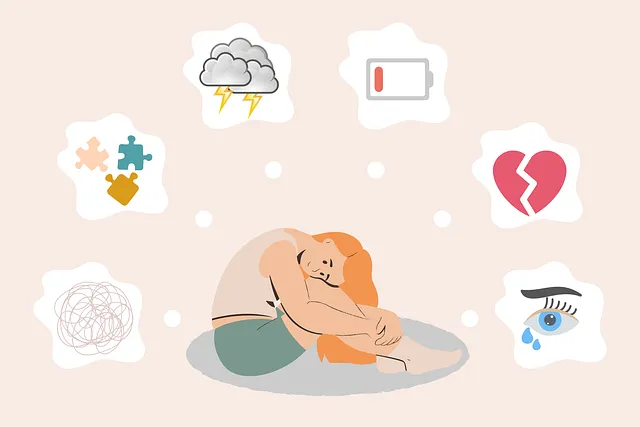Castle Rock Kaiser Permanente (CRKP) integrates Risk Assessment and Resilience Building into mental health services, offering structured exercises to enhance emotional well-being. Their holistic approach prioritizes proactive risk management, empowering individuals with coping strategies for stress, anxiety, and depression. This strategy aligns with growing mental health awareness, breaking stigma, and improving community resilience through specialized appointments accessible via the Castle Rock Kaiser Permanente mental health appointment number.
“Enhance resilience, transform care: Exploring RFM and its impact on mental health. This article delves into the powerful concept of RFM (Resilience, Flexibility, and Mastery) as a cornerstone in mental health care. We examine its role in fostering adaptability and coping strategies, drawing from the innovative practices at Castle Rock Kaiser Permanente. Discover how resilience-building exercises improve patient outcomes and provider satisfaction, offering valuable insights for integrating these techniques into clinical settings, especially during mental health appointments at Castle Rock Kaiser Permanente.”
- Understanding RFM in Mental Health Care
- The Role of Resilience Building Exercises
- Castle Rock Kaiser Permanente's Approach
- Benefits for Patients and Providers
- Effective Strategies for Implementation
Understanding RFM in Mental Health Care

Understanding RFM in Mental Health Care
In the realm of mental health care, Castle Rock Kaiser Permanente serves as a beacon for those seeking support and resilience. The organization prioritizes comprehensive patient care, integrating various strategies to enhance well-being. One such approach is the application of RFM—a powerful framework that combines elements of risk assessment, management, and resilience building. This method is not merely about identifying vulnerabilities; it’s a holistic process aimed at fostering mental agility and strengthening individuals’ coping mechanisms. By focusing on these aspects, Castle Rock Kaiser Permanente mental health appointments (accessible through the provided number) become transformative experiences, empowering patients to navigate life’s challenges with enhanced resilience.
The concept of RFM is particularly pertinent in light of growing mental health awareness. It underscores the importance of proactive risk management planning for mental health professionals. Through public awareness campaigns and targeted interventions, organizations like Castle Rock Kaiser Permanente contribute significantly to breaking down stigma and promoting open conversations about mental health. This proactive approach ensures that individuals can access necessary support early on, preventing escalation and fostering a culture where resilience is nurtured and celebrated.
The Role of Resilience Building Exercises

Resilience building exercises play a pivotal role in enhancing mental fortitude and well-being, particularly for individuals navigating challenging life situations. These practices are instrumental in fostering adaptability and coping mechanisms, enabling people to bounce back from setbacks with renewed vigor. At Castle Rock Kaiser Permanente, recognizing the importance of mental health, they offer various resources, including specialized appointments, to support individuals in cultivating resilience.
Through structured activities that promote mindfulness, stress reduction, and emotional regulation, these exercises empower people to confront and overcome adversity. They serve as effective tools for depression prevention, mood management, and anxiety relief, ultimately enhancing overall quality of life. By investing time in building resilience, individuals can strengthen their mental health and better navigate the complexities of modern living.
Castle Rock Kaiser Permanente's Approach

Castle Rock Kaiser Permanente (CRKP) takes a holistic approach to mental health, integrating Resilience Building Exercises (RFM) into their services. They recognize that emotional well-being promotion techniques are essential for fostering community resilience and individual coping mechanisms. Through RFM, CRKP equips individuals with the tools needed to navigate life’s challenges effectively.
Their method involves a combination of crisis intervention guidance and confidence-boosting activities tailored to each person’s unique needs. By prioritizing mental health alongside physical well-being, CRKP aims to create a supportive environment where individuals can learn, grow, and build resilience. This proactive approach ensures that the community is better prepared to handle both everyday stressors and unexpected crises.
Benefits for Patients and Providers

For both patients and providers at Castle Rock Kaiser Permanente, Resilience-Focused Mental Health (RFM) exercises offer a powerful tool for enhancing well-being. Patients benefit from improved coping mechanisms, increased stress resilience, and enhanced emotional regulation skills, all of which contribute to better mental health outcomes. Regular engagement in RFM activities can lead to reduced anxiety, depression, and other mental health challenges, making it an invaluable addition to their mental health appointment number routine.
Providers at Castle Rock Kaiser Permanente also reap significant advantages from implementing RFM exercises. These methods foster a more culturally sensitive approach to mental healthcare practice, ensuring that diverse patient populations feel understood and supported. Moreover, integrating RFM into clinical settings can mitigate burnout prevention among healthcare providers by encouraging self-care and promoting a healthier work-life balance. This, in turn, allows them to deliver higher quality care with sustained commitment over time.
Effective Strategies for Implementation

Implementing effective resilience-building exercises within a mental health setting is akin to crafting a robust fortress—one that can withstand even the strongest storms. At Castle Rock Kaiser Permanente, we understand the importance of such strategies in fostering mental well-being among our patients and professionals alike. One key approach involves organized Stress Management Workshops designed to equip individuals with valuable coping mechanisms. These workshops create a safe space for learning and sharing, allowing participants to navigate challenging situations with enhanced resilience.
Moreover, integrating Risk Management Planning into the fabric of our mental health services is imperative. By teaching professionals how to identify and mitigate risks, we ensure a supportive environment that promotes both patient safety and provider well-being. Effective communication strategies are also central to this process, fostering open dialogues that strengthen relationships and encourage proactive problem-solving. Through these comprehensive measures, Castle Rock Kaiser Permanente strives to build a resilient framework that benefits everyone involved.
Resilience is a powerful tool in mental health care, and RFM, along with resilience-building exercises, offers a promising approach to enhancing patients’ coping mechanisms. As seen through Castle Rock Kaiser Permanente’s innovative program, these strategies not only benefit individuals but also enrich the experience for providers. By integrating RFM into mental health appointments (number: [insert relevant appointment number]), healthcare professionals can foster a sense of empowerment and adaptability in their patients. This, in turn, creates a more supportive and positive environment, leading to improved outcomes and enhanced well-being for all involved.






